Judd and Gilman are a World’s Championship Team
Monday, August 13, 2007
by Ann Bullard
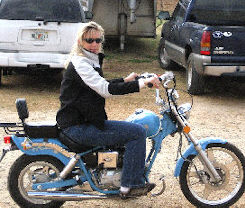 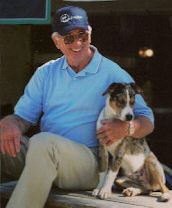
Gilman and her motorcycle Judd and Blue
Saturday, Aug. 22, 1981. It’s stake night at Louisville. Screams of Elvira from Cardinal Stadium pound the air just as trainers of the Fine Harness World’s Grand Championship contenders made their final adjustments before entering Freedom Hall.
Two of the industry’s ‘tall men’ had their horses ready to go. Tom Moore and Big Bird had won the stallion and gelding qualifier. The other had driven Tom Galbreath’s Sultan’s Santana to reserve. It was showdown time!
That other man, Don Judd, looked back. “I remember sitting in the chute; we wouldn’t go into the round part because Santana would get so excited. Just as we checked his head up, the Oak Ridge Boys began singing Elvira and the crowd went crazy. He got so big! He went in and made a beautiful show!”
It had been eight years since Sultan’s Santana had won the Fine Harness Three-Year-Old Stake with Don Brockman on the lines. He’d been retired to stud before Judd joined Castle Hills.
“When people came to see him, we had to lead him out from the breeding barn. I asked Mr. Galbreath if I could bring him back and put him in the show barn so people would see him as a pretty horse. I knew he was broke to jog. I started to keep him exercised and he kept getting better and better.”
Galbreath recalled that those days. “We kept watching Big Bird win all season. We’d been working Santana to keep him fit and healthy for breeding. I kept thinking, ‘Maybe we could beat Big Bird.’
“We had bred Santana Tuesday morning and then put him on the truck for the drive to Louisville,” Galbreath said. “As I was leaving the show grounds, I saw a tow truck pulling in with Santana behind it. He was a little bit tired when he showed that night. When Big Bird beat us in that first class, I thought, ‘Uh, oh. That gamble didn’t pay off well.’
“With the truck in the shop, we kept Santana at the show grounds. On Saturday, we still hadn’t decided whether to show him back. George and Joanne Kurz, my wife, Betsy, and I were in partnership. The four of us met at the Executive Inn and had prayer and a roundtable discussion about it. George and Betsy said no, Joanne and I said yes. We convinced the other two it was OK,” Galbreath continued.
Judd gives Bobby Gatlin credit for part of that decision-making process. “He was on the other side of the shed row at Louisville. He walked around Saturday afternoon asking if we were showing back in the harness stake. I remember so clearly Bobby saying, ‘You ought to show that horse. You don’t get many chances to show a horse that great.’”
A well-rested Sultan’s Santana proved that a fit 11-year-old could best a group of nine other fine harness horses. Big Bird, a horse that Galbreath had sold to John and Dorothy Lenore, tied reserve. That world’s grand championship class was the gelding’s only loss of the season.
Rick Judd, the elder of Judd’s two sons, spoke of that night and his running around betting people Santana would not compete for the grand championship. “Dad told me he had decided not to show back. I thought I had some inside information or something. It worked out pretty good so I didn’t mind at all. I probably made him pay off my bets,” Rick said.
The two years Judd spent at Castle Hills were the last ones he spent outside his adopted home state of Florida. He’d taken a long road to get there.
“My first introduction to horses came when Dad bought my first horse at the Cookeville Stock Yards. I was 10 years old.” Judd recalled, adding, “We knew absolutely nothing. My aunt had given me a silver dollar for every ‘A’ I made. I took my $40 to Nashville to buy a saddle. Dad bought my horse for about $20.”
‘Charlie,’ as the youngster named his horse was Judd’s “bicycle. When I went camping, he’d lay down beside me. He’d swim with me. I think he thought he was a person. When I went in the house, he’d wait by the front door.”
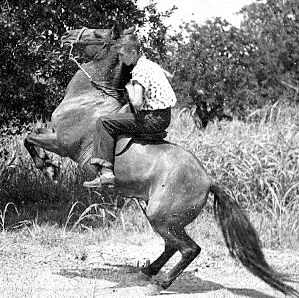
Judd’s first horse “Charlie Judd”
Bill Carrington, long-time horse show announcer and insurance representative, grew up in Cookeville with Judd. He recalls his friend showing horses and starring as a center on their high school basketball team. Since Judd’s father was in the trucking business, one-night shows were all the family could attend. Fortunately, Tennessee had many of these.
Charlie worked well for a horse to ride at home and smaller shows. However, Saddle Horses had caught Judd’s attention. His father bought his son’s first five-gaited horse as a birthday present.
“J.T. Leach had Saddle Horses then,” the trainer recalled. “We’d been seeing one black horse win a lot. We were at Gallatin, Tenn., when Dad walked up and asked J.T. what he wanted for him. The $750 he asked was a lot of money then. Dad stood there a few minutes and said, ‘I can’t do that.’ After we went to the car, he went back and bought the horse for $450.
“I just started riding him and kind of figured out what he was doing. Within a month, we went to a Cohn High School show in Nashville. I didn’t know a thing, but we got a ribbon. Three or four weeks later, we showed at Oak Ridge and were second in the Five-Gaited Championship. We beat a bunch of trainers. That was kind of my getting started. We learned he could be driven, so Dad found an old buggy. He or Mom would show in fine harness and I would take him in five-gaited classes.”
By the time Judd was a teenager, he was working horses for other people. He began with a horse belonging to a local dentist. He later added a walk-trot and a gaited pony to his ‘show string.’ Carrington and others boarded their horses there.
“I think I was getting $150 a month board and training. That was a lot of money for me,” Judd said with a laugh. “Over that period of time, I had several different horses. Dad couldn’t afford to buy anything big, but he loved to trade around.”
Although Judd had shown a five-gaited horse, he had yet to gait one on his own. When one of his father’s trades didn’t work out, Judd selected a two-year-old in his stead.
“I was 14 or 15 and ‘already knew everything’ I needed to know,” he said with his usual good humor. “I broke and started working the colt. Jack Bullock lived in Cookeville at the time and he showed me how to rack him. We won a lot of classes.”
Judd says the horse’s claim to fame was his slow-gait … ‘similar to Imperator’s but a long time before. When I sold him to Lloyd Teater, I thought I had hit the big time.”
Carrington has great memories of those days. He spoke of driving up to the Tennessee and Southern Kentucky one-nighters. “Don had a group of big tractors with sleepers and all that were used to haul furniture around the country. On weekends, he would hook one to a trailer and go to the show with this great big tractor pulling a six-horse behind it. We used to laugh that it looked like Dodge Stables had arrived at a one-night show.”
Saddlebreds in Middle Tennessee were at their peak during those years. Judd continued working horses at home until he was a high school junior. Like many others who star on the national scene today, he spent a summer with Doss Stanton at Oman Farms. “I rubbed horses and watched,” he said. “I kept coming back home and applying what I saw until I went to work for someone else.”
Their local horse show, the Putnam County Fair, gave Judd – and Carrington – a step up into what would be an important part of their careers. Both young men’s parents served on the Saddlebred and walking horse show committee.
“They had a good horse show,” Carrington recalled. “They gave us the opportunity to do something that was very important. The very first show I announced was the local show at the fair; then I announced the open show. The committee decided they should let Don judge American Saddlebreds. He did a very good job. This led to his being asked to judge other shows even though he was a very young man.”
Judd attended Tennessee Tech in his hometown before marrying and going to work for the late Ellis Waggoner at Brownview Farm. After about a year and a half, he moved on.
“I moved around a lot to start with,” Judd said. “I had a private job in Knoxville and then worked at Happy Valley with Sam [Brannon.] I helped train a lot of world’s champions during those three years.”
Stints with John Crawford and Ruxer Farm, where he worked the last crop of Valley View Supreme babies, led him to Rock Creek, where he honed his skills under Ed Teater. When Teater moved to Dodge Stables, Judd opened his own barn. Eight years later, he was “lured” to Pennsylvania and from there to Castle Hills. Again, world’s champions came through his hands. A private job in the Tampa area brought him to Florida. During those years, he met a family whose influence and friendship would help cement his career.
Barbara and the late Todd Woods already were well established in the Saddle Horse and Thoroughbred businesses when Judd, his former wife, Anne, his sons, Rick and Ronnie, and step-daughter Christie moved to Florida. The Woods’ daughters had aged out of the junior exhibitor division; the family was down to one horse when they moved to Judd at Jack Wilson’s Baytree Farm in Odessa. When Judd realized it was time to move on, the Woods were there to help.
“Todd had property that had been an orange grove in Land O’Lakes,” Barbara said. “The grove had been killed in a freeze and he didn’t want to replant. He knew Tampa was growing that way. Todd took Don out there to look at the property, telling him ‘I’ll build a barn out here for American Saddlebreds and also for Thoroughbreds.”
Don’s response, “Will they ever find us out here?” brings a smile to those who know Land O’ Lakes today. What had been a rural area now is one of the hottest spots in North Tampa, with multi-million dollar subdivisions and shopping centers lining what had been a two-lane, rural highway. Judd Stables occupied one end of ‘Woods LB,’ with the Thoroughbred barn at the other.
“Fortunately, it worked out where Toddy could build the farm and have Don there,” Barbara Woods added.
A young Maria Gilman began her transition from Morgans to Saddlebreds “just as they were starting to build that barn.” That was in 1985. Except for the time she spent in college, Gilman has been part of the Judd Stables crew for almost 22 years.
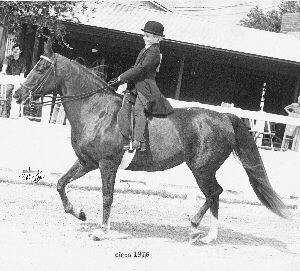
Gilman grew up showing Morgans
from her family’s farm.
Gilman’s physician-father, a Vermont native, raised his five children in Ocala, Fla., riding Morgans. For the most part, they did their own thing, although Cathy (Hackney) and Tanker Pruitt did train from their farm for several years. Gilman’s park horse was in training with the late Jimmy Glidewell.
“Everyone learned on one Morgan,” Gilman said. “When we took him to Morgan shows, he’d show in about 20 classes.”
Gilman concedes hers was a different background than most trainers in the Saddlebred world. “We spent pretty much every day playing and working at the barn. My two brothers, two sisters and I shared the chores, suits and hats. We had a big Morgan youth group and did a lot together. I learned to be a rider because I rode a lot of young orangutans. I didn’t exactly ride highly trained horses.
“We did a lot of typical 4-H one-nighters,” Gilman added. “That’s what we did as a family on our weekends, summers and everything. We raised a lot of babies on the farm.”
Gilman’s family put her Morgan equitation horse in training with the Judds. She was 15 when she first joined the team. “It was an eye opener. I saw [and learned] how to take care of horses, equipment and to present a horse. I would drive three days a week from Ocala and rode other days at home. After Kathy and Tanker left [the Ocala farm,] I began teaching her students.”
The Gilmans bought their daughter her first Saddlebred, Ding, Dang, Do. She showed him under saddle; her father drove him. She took a year’s leave from school after high school graduation to finish her equitation career. After spending a year at Furman University in Greenville, S.C., she completed her degree at Stetson University in DeLand, Fla.
“I was heading toward medical school or physical therapy. I went to graduate school for a while, but I kept ending up with the horses.” Gilman explained. “My family agreed this was what I needed to do for a while. I didn’t commit for life but I will do this as long as I’m happy and keep staying happy. I feel like I use my education every day; it helps at caring for horse and people injuries and rehabilitation.”
While Gilman’s initial commitment to the horse industry wasn’t ‘for life,’ it certainly seems that way today. She traveled, tried different jobs in the industry and showed horses for other people until she realized Judd Stables was home.
“I pretty much started from the bottom, grooming and teaching. I had been around long enough so I knew the routine. A lot of great people gave me good opportunities. Rock The Night was the first horse I had anything to do with as a professional. He has been a wonderful horse for a lot of people.”
Diane Sembler purchased the bay three-gaited horse Pagan Prince, adding him to her string of horses at Judd Stables. He came with the reputation as a ‘tough horse;’ however, Judd and Gilman found his key. On Aug. 17, 1997 Gilman won her first world’s championship: the Ladies Three-Gaited Under 15.2 title.
There’s no question Judd and Gilman are an excellent team of trainers. The horses that have passed through their hands make that evident. Working together, they have trained 22 world’s champions. CH Winter Day, CH Gypsy Supreme, American Wine, CH Sweet Virginia, CH Passion, CH Like An Admiral and CH Undulata’s Perfect Gift ERB are but a few on that list. In earlier days, Judd took 15 others to world’s championship honors. CH Oh By George, CH Well Chosen, CH Olympic Flame, CH Lily Merrill, CH Set The Style and CH Valley Witch, along with Sultan’s Santana, highlighted his younger years.
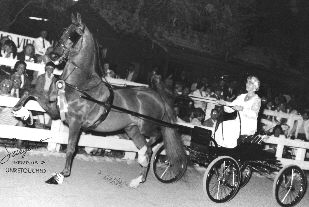
Judd selected CH Well Chosen as a
ladies fine harness horse for his then
mother-in-law, Jane Durham. They won
Louisville’s Ladies Fine Harness Stake
and Amateur Fine Harness
Grand Championship in 1984.
As good as Judd and Gilman are with making showing horses, their forte is their junior exhibitor and amateur riders. Barbara Woods has been a constant in their lives.
“They work so well together; they complement each other,” Woods said of her trainers and friends. “Maria has such a nice way about her. She doesn’t yell at you, but explains things. She gets along with anybody, from me down to the little ones. She helps us learn and work through difficulties. I don’t know of a better combination than the two.”
Judd and Gilman are more than trainers. They are friends, who helped Woods through one of the most difficult times in her life, when her husband died in 1990.
“I did away with the Thoroughbreds,” Woods said. “We could see Tampa moving north and that Highway 54 would be widened. I found another piece of property and sold the 80-plus acres. It’s now a very nice shopping center and big apartment complex. We had several years in which we knew the move was coming. Don and Ronnie had time to work on barn plans. When it came time to build, Don knew exactly what he wanted.”
What he wanted included a reinforced concrete block barn that could withstand almost any storm that hits the Tampa area. Woods says the tack room is where she is going in case of a hurricane. It’s a spot she hopes she doesn’t have to use.
“The barn will be four years old in October,” Woods said. “When we had to move out of the old barn in September, we looked in the area to see if we could find enough stalls. We decided to move into a tent until the arena could be finished and to move the portables in there until the barn itself was ready.”
Ronnie Judd works full time as farm manager, handling everything but the horses. “He can do, fix or build anything,” Woods said. “He’s just remarkable and wonderful to have there.”
Woods has many wonderful memories of her time with Judd and Gilman. “I’ve had some awfully nice horses with Don. My latest great memory is winning at Louisville and Kansas City with Sweet Virginia. She’s a-once-in-a-lifetime horse. Having Don and Maria find her for me and teach me to ride her is just a thrill, one I’ll never forget.”
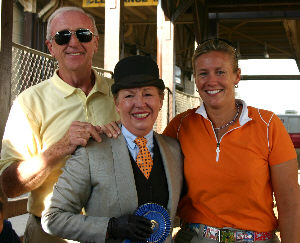
Judd and Gilman with Barbara Woods
Jim and Cheryl Sotrop moved their horses to Judd’s about 10 years ago. She says she got to know the trainer when he was a patient at University Community Hospital where she worked in the lab.
“I knew who he was, that he was a horse trainer. I got to know Barbara and Maria the same day. I gave him lots of really good drugs and he promised me the world,” Sotrop said with a laugh. “I ended up calling and moving my horse and have been with them ever since.”
Sotrop evaluated the Judd team. “Each has different strengths. Don is a spectacular, phenomenal five-gaited trainer. Maria is a beautiful rider and makes riding horses look effortless. Every time I see her I envy that capability.”
Sotrop, Tricia Long and Anitya Marlowe are known as “the rat pack … the barn troublemakers,” she said. “We always come up with good gags. We celebrate Don’s birthday at Chattanooga. One year we gave him a green Speedo …”
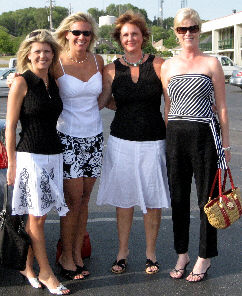
The Judd Stables ladies, (l-r)
Anitya Marlowe, Gilman, Cheryl Sotrop
and Tricia Long took time out for a
photo on their way to a party during
the Chattanooga Charity Horse Show.
Sotrop had been without a horse to show for several years when Judd and Gilman bought Worthy’s American Society last winter. “The day they told me they found a really nice horse for me probably was my best day at the barn. Watching Don show him for the first time at Tampa ranked right up there.”
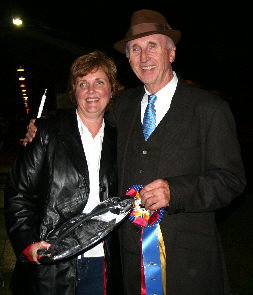
Judd and Sotrop celebrated his win aboard
Worthy’s American Society in Gasparilla Charity’s
Five-Gaited Stake.
Claire Karst began her Judd Stables career during Gilman’s early years. She has ridden under Gilman’s tutelage since she was nine years old.
Anita Karst, Claire’s mother, spoke of Gilman’s professionalism and concern for her students. “Maria’s number one priority is, ‘are you having a good time,’” Karst said. “Next is, ‘are you doing the best you can.’ Ribbons rock, but I never worried about Claire from the ‘you’ve got to win’ angle. It was ‘do the best you can, get the most out of your horse and feel good about what you did.’ As a parent, I really, really appreciate that.”
Claire had some tough times from the horse standpoint during her career. One died, one was very badly hurt. Ooh La Latte’s injury left Karst without a mount at the 2003 Asheville Lions Club Show. Gilman had won the open park qualifier with Woods’s Man In My Life.
“Maria told Claire, ‘You have to show this horse in junior exhibitor park. She went out and won it,” Anita Karst said. “Between Barbara and Don and Maria, they made it work out. She has spent 12 or 13 years at that barn. It’s where she grew up.”
At 15, Jackie de la Parte has posted some great times and great wins from Judd Stables. She moved to Judd when she was 10 years old. In 2005, Judd and Gilman teamed her with the three-gaited Keeper Of The Stars. They won a reserve world’s championship in the 11-entry junior exhibitor 13 and under championship after a third place finish in the 12-13 year-old qualifier in their first trip together on the green shavings. After missing a year while her trainers judged the world’s championships last year, she will be back in Freedom Hall in August.
“Maria is really nice and a great teacher. She’s always looking for new ways to make it easier for you to understand something. Mr. Judd usually works with me when I’m riding my show horse, Maria teaches me on school horses,” she said after a morning’s workout without stirrups at the barn. “I need strength for workouts; we do a lot of workouts as well to keep in tip-top shape. You never know; doing patterns makes you a better rider.”
De la Parte agrees with other Judd clients. The whole atmosphere at the stables is “like family. Everyone is there to cheer you on.”
Customers call the Judd group family. That actually extends beyond the Land O’Lakes team to Gilman’s Ocala family.
“We do camp every summer. We’ll load up a bunch of school horses and spend a week at my parents’ farm. It’s become a really neat thing. We live on the farm, play volleyball and soccer and spend hours riding every day. The kids will help feed – and make their own meals. They all look forward to it,” Gilman said.
“I have a wonderful, close family of my own. They’re great. Since I’ve been here, the most important people in my life are Don and Barbara,” Gilman said, adding she appreciates the opportunities she’s had. “Don and I work really well together. I try to keep the joy and fun in what we do. He’s more professional and keeps everything going in the right direction. We balance each other out.
“The kids love his teaching them when I’m out of town. He’s a little more structured; I play a little more. Together we’re a good match and can do a good job. I really enjoy the relationships with the people. At times, I get more involved than I should. But I love that part,” she added.
She also enjoys working with young horses, getting them to the point that others can be successful with them. Woods spoke about their teamwork.
“They divide their work and share horses,” she said. “I often see them working the same young colt. Don will teach it to rack, Maria may work on the trot. They complement each other and discuss different aspects of their work. I don’t know of a better combination than the two of them working together.”
As hard as they work, Judd and Gilman take time to play. They try to spend some weekends – or even a week - on their boat.
“We try to get away from the horse stuff, to maintain a nice balance,” Gilman said. “Last fall, we spent a week herding cattle in Wyoming with our good friends Sam and Anne Stafford. That was the trip of a lifetime.”
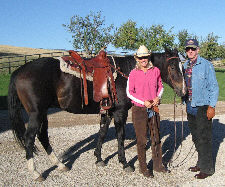 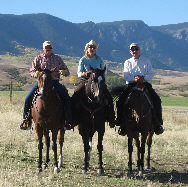
Sam and Anne Stafford joined Judd and Gilman
on their 2006 Wyoming vacation. Sam, Gilman
and Judd paused for a photo-op
during one of their trail rides.
Gilman’s Christmas present to Don last year helps demonstrate how much he still simply loves horses. “She bought him a western saddle trimmed in silver,” Woods said. “Every so often, we catch Don riding around the farm in his western saddle on a Quarter Horse or a school horse. He genuinely loves the horses, and enjoys what he’s doing.”
Don took a somewhat frank look at himself. “I’m the kind of person you either like or you don’t. I’m not terribly outgoing. We try to take a vacation at least once a year. The Wyoming trip wasn’t something I thought I ever would do, but it was one of the highlights of my life. Rick and Ron are both married; every year at Christmas we all go on a cruise.”
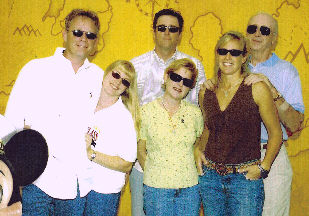
The Judd family plays together.
Pictured (l-r) are Ron Judd, his wife,
Rick and Coco Judd, Don Judd
and Maria Gilman.
A country boy, Don says one of his hobbies is eating. He likes good country food. Movies and time on the water help him to relax.
Both Judd and Gilman spend time giving back to the industry they love. Much of that is through their judging. He has held the cards at most major shows in the country. On his last occasion at the 2006 World’s Championship Horse Show, Gilman served on the panel.
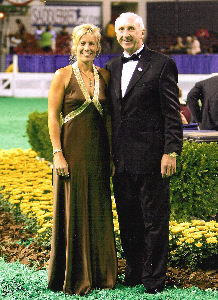
Don Judd and Maria Gilman judged
the 2006 World’s Championship Horse Show.
“I enjoy judging,” he said. “I think we need more people doing it. Yes, you have to stand out there and make decisions some other people don’t necessarily agree with. Those who do the most complaining probably never have stood out there and judged. Those who have [judged] understand that we’re out there doing our best. I am the first to say I am sure I have made a lot of mistakes. We can’t tie a class, go back to the hotel, discuss it and come back the next day to redo it.”
“Maria is a very popular judge,” he continued. “When we did Louisville last year, Maria didn’t like to sit much [in the judge’s box.] She didn’t have much to do, and wanted to go out and sit in our box. I told her a lot of people her age didn’t have the opportunity to sit down here. It’s completely different sitting there and looking at the ring from the inside. You’re a lot closer to the horses and get a different feel for them.”
One thing is indisputable: Judd and Gilman are interesting people as well as trainers. Both enjoy getting up in the morning and going to work. Friends speak of Don as always being ready with a good story.
“Every day is a challenge. I enjoy watching people start to learn. We work hard to put the right riders with the right horses,” Judd said. “We do whatever we have to do to get to that point. I’ve never begrudged a day I’ve worked at the barn.
“I try not to create problems,” he continued. “I’m sure I have with my fellow horsemen over the years but I think we all get along. We understand what we’re doing and why. I tell people folks are in this business to enjoy it. They go to the doctor and dentist because they have to. I work hard to make this fun for our people. That’s part of who I feel I am.”
Gilman thinks she is pretty easy to read. “I feel every day is a gift from God. I wake up, enjoy life and do what I can to be good to people. I try to be successful at what I do and to be true to who I am. I do get very involved with the kids and other customers’ lives. There’s so much more to this than training horses. I feel I’ve halfway raised a group of kids. What they become is very important to me. If I get to the point that doesn’t matter, I need to do something else.”
From all appearances, such a change seems light-years away.
|